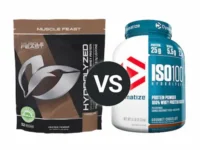Knowledge BaseYou're Questions Answered
Is whey protein powder safe for toddlers?
Whey protein powder is a popular dietary supplement derived from milk, commonly used by adults to support muscle growth, recovery, and overall protein intake. However, when considering the use of whey protein powder for toddlers, it is important to evaluate its safety and appropriateness, given the specific nutritional needs and developmental considerations for young children.
Considerations for Toddlers
1. Nutritional Needs of Toddlers
Toddlers (typically aged 1-3 years) have specific nutritional requirements that differ from those of older children and adults. Their diet should primarily consist of a balanced mix of carbohydrates, proteins, fats, vitamins, and minerals, primarily obtained from whole foods. Protein needs for toddlers are relatively low compared to adults, with the recommended dietary allowance (RDA) being approximately 13 grams per day1.
2. Protein Intake from Whole Foods
In most cases, toddlers can meet their protein needs through a balanced diet that includes a variety of whole foods such as dairy, eggs, meat, fish, legumes, and whole grains. These foods not only provide protein but also offer essential nutrients like iron, calcium, and vitamins, which are crucial for growth and development2.
3. Safety and Appropriateness of Whey Protein for Toddlers
While whey protein powder is generally safe for consumption, it is typically formulated for adult dietary needs and may not be necessary or appropriate for toddlers. The high protein content in whey protein supplements can exceed a toddler's protein requirements, potentially leading to an imbalance in their diet. Moreover, many protein powders contain added ingredients, such as sweeteners, flavorings, and preservatives, which may not be suitable for young children.
Potential Risks
1. Excess Protein Intake
Excessive protein intake can place a strain on a toddler's developing kidneys, as they process and excrete the byproducts of protein metabolism. This can be particularly concerning if a child's overall diet includes high-protein foods alongside protein supplements3.
2. Additives and Sweeteners
Many commercial whey protein powders contain artificial sweeteners, flavors, and other additives that may not be ideal for toddlers. These ingredients can contribute to unhealthy eating patterns and may not align with recommendations for a balanced diet for young children.
- Institute of Medicine. (2005). Dietary reference intakes for energy, carbohydrate, fiber, fat, fatty acids, cholesterol, protein, and amino acids. National Academies Press.
- American Academy of Pediatrics. (2014). Pediatric nutrition handbook. Elk Grove Village, IL: American Academy of Pediatrics.
- Koletzko, B., Goulet, O., Hunt, J., Krohn, K., & Shamir, R. (2005). Guidelines on paediatric parenteral nutrition of the European Society of Paediatric Gastroenterology, Hepatology and Nutrition (ESPGHAN) and the European Society for Clinical Nutrition and Metabolism (ESPEN). Journal of Pediatric Gastroenterology and Nutrition, 41, S1-S87.
Related Questions
Related Reviews

Your Answer
We are a participant in the Amazon Services LLC Associates Program, an affiliate advertising program designed to provide a means for us to earn fees by linking to Amazon.com and affiliated sites.



